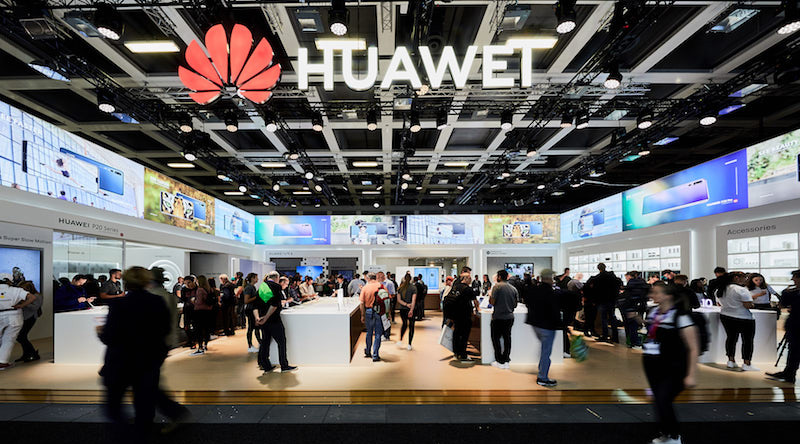Year in review: Innovation, Hallmark of Huawei’s Rise to Fame
According to initial data from the International Data Corporation (IDC) Worldwide Quarterly Mobile Phone Tracker, smartphone vendors globally shipped a total of 355.2 million units during the third quarter of 2018, resulting in a year-on-year decline of 6%.
 But while the industry trends are appearing to lose juice, Huawei shipped 95 million units of smartphones globally in the first half of 2018 alone, growing its shipment despite the downward trend and ascending to second place for two consecutive quarters (Q2 and Q3), with 14.6% global market share in the third quarte of 2018, as recorded by IDC.
But while the industry trends are appearing to lose juice, Huawei shipped 95 million units of smartphones globally in the first half of 2018 alone, growing its shipment despite the downward trend and ascending to second place for two consecutive quarters (Q2 and Q3), with 14.6% global market share in the third quarte of 2018, as recorded by IDC.
Huawei earned its rank as second smartphone vendor in the Middle East and Africa region with a 21.5% of market share, according to the Growth from Knowledge (GFK) August 2018 report. This is an indication of the company’s strong performance this year as Huawei focused its efforts on the development and use of Artificial Intelligence (AI) in its devices to improve users’ experience and further pushed its AI on device strategy where AI is embedded on the chipset of the phones, turning smartphone devices into intelligent machines. These breakthrough innovations are a testimony of Huawei’s heavy investment in Research and Development, the giant tech invested US$45 billion over the last 10 years and a whopping US$13.23 billion last year only, making it one of the leading companies worldwide in terms of investment in R&D.
This innovative approach to products has enabled Huawei to conquer consumers worldwide, and especially Qatar where users tend to long for innovative features and products.
In retrospect, Huawei took the Qatari market by storm in 2018 – starting with the launch of the HUAWEI P20 series featuring the world’s first 40 MP Leica triple camera, powered by AI, and more recently with the HUAWEI Mate 20 series.
 Dubbed as King of Smartphones, the first phase of the HUAWEI Mate 20 Pro completely sold out in the pre-order phase before even hitting the store shelves, the phones sales significantly increased in comparison to last year’s Mate 10 series – a witness to the growing demand of Huawei’s flagship products in Qatar. And to wrap up an outstanding year, Huawei chose Qatar to announce the launch of the limited-edition PORSCHE DESIGN HUAWEI Mate 20 RS as part of its ongoing collaboration with the luxury brand Porsche Design. Qatar was selected as one of only a few countries in the world to debut this premium smartphone which is also one of the most expensive smartphones in the market to date.
Dubbed as King of Smartphones, the first phase of the HUAWEI Mate 20 Pro completely sold out in the pre-order phase before even hitting the store shelves, the phones sales significantly increased in comparison to last year’s Mate 10 series – a witness to the growing demand of Huawei’s flagship products in Qatar. And to wrap up an outstanding year, Huawei chose Qatar to announce the launch of the limited-edition PORSCHE DESIGN HUAWEI Mate 20 RS as part of its ongoing collaboration with the luxury brand Porsche Design. Qatar was selected as one of only a few countries in the world to debut this premium smartphone which is also one of the most expensive smartphones in the market to date.
What attracted users in Qatar to the HUAWEI Mate 20 series is the pioneering technology: the Huawei mate 20 pro features the world’s first Leica wide angle lens in a smartphone, as well as the world’s first in-screen fingerprint and the ground-breaking wireless reverse charging feature, which enables the Huawei mate 20 pro to charge any other smartphone by simply placing two phones back to back, as long as it supports QI charging.
Huawei has a long-standing legacy with Qatar-based entities as part of its objective to enrich people’s lives and bring them together through technology. Huawei has launched a number of major projects in Qatar, including a new high-capacity CCTV storage project with Hamad International Airport, as well as a state-of-the-art IP Network Backbone with Qatar Rail. Huawei’s partnership with Ooredoo earlier this year is part of catering to the growing ICT and telecommunication needs in the region.
Conscious of the fact that confidentiality protection is the only way to earn and maintain user’s trust, Huawei’s privacy protection measures extend from the product’s design throughout the entire development process and complies with GAPP principles– the most stringent privacy technology framework in the world – and all requirements set forth in the EU’s General Data Protection Regulation (GDPR).
Huawei Consumer Business Group (CBG) is investing more than US$50m in research and innovation of security technology this 2018 to ensure the continued cyber security of its users. To that end, the company appointed over 200 cyber security experts and engineers to work in research centres in China, Germany, Finland, Canada, and Singapore, and created over ten partnerships around the world, including security manufacturers, consulting firms, industry alliances, and industry organisations.
In 2018, what differentiated the good from the truly amazing was innovation, which has always been the hallmark of Huawei’s rise to fame.





